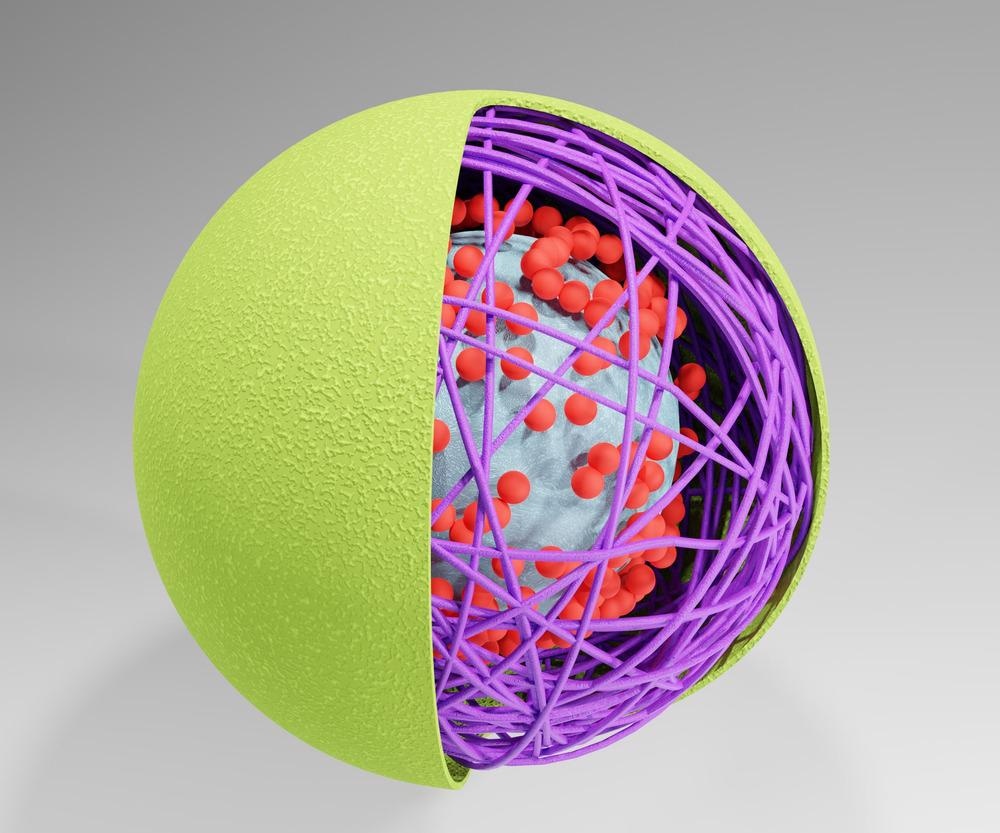Nanotechnology has provided several cutting-edge applications for science and industry, including nanosensors, nanorobots, nanofibers, and nanostructures. This article will discuss one such technology, nanocapsules, and the importance of the technology for numerous industries.

Image Credit: Love Employee/Shutterstock.com
Nanocapsules – An Overview
Nanocapsules are nanoscale shells consisting of a nontoxic polymeric membrane that encapsulates a liquid core; desired products are placed inside this shell. The core contains an oil surfactant specifically designed to coordinate with this stored compound.
Typical polymers that used in the shell include poly(lacticide) (PLA) and poly(lacticide-co-glicolide) (PLGA.) Synthetic polymers are preferred due to purity and reproducibility, but some natural polymers are also utilized. These natural polymers include gelatin, albumin, and sodium alginate. Liposomes, polysaccharides, and saccharides are also sometimes used.
Numerous methods are used to synthesize polymeric nanocapsules. These include emulsion diffusion, nanoprecipitation, layer-by-layer deposition, and solvent evaporation. Many other modifications of these methods have been explored in recent years, including interfacial polymerization and the solvent displacement technique.
Nanocapsules have unique properties that make them attractive structures for several industries, including biomedical sciences.
Due to their small size, nanocapsules can penetrate basal membranes making them attractive carriers for drug delivery. The low aspect ratio of their shape allows them to penetrate cells more easily than capsules with high aspect ratios such as rods. Their surfaces can also be customized with antibodies and cell-surface receptors to recognize biomolecules for targeted delivery.
The many potential applications of nanocapsules ensure their future as a promising technology. One particularly interesting study that used a natural source for nanocapsules is listed below.
Delivering Drugs Using Nanocapsules Derived from Cow’s Milk
A team at Virginia Tech has purified exosomes from cow’s milk to create nanocapsules for drug delivery. Exosomes are naturally occurring nano-sized capsules that produce and protect courier molecules, possessing a particular characteristic that makes them attractive for drug delivery: hardiness. They withstand enzymatic action, along with other environmental hazards such as fluctuating temperature and biological acids.
While abundant in milk, isolating exosomes can be challenging. The team developed a new scalable, cost-effective method to extract these biological compounds from cow’s milk to overcome this. The study used an adapted tangential flow filtration technique developed by Joy Wolfram of the Mayo Clinic.
Currently, the problem of isolating exosomes at scale prevents their widespread adoption in clinical practices. With this research, however, the possibility of orally delivering targeted drugs has been opened. Instead of receiving an injection, individuals may be offered a milkshake containing therapeutic exosomes.
The Size of the Industry
By 2027, the global nanocapsules industry is predicted to reach $4.2 billion. In 2020 the US market was estimated to be at $796.9 million, and in China, the market share is estimated to grow to $734.3 million by 2027. China is predicted to be amongst the fastest growers in the market segment.
Competitors in the industry include GAT Food Essentials, Eos Biosciences, Encap, Cerulean Pharma, Capsulation, PlasmaChem GmbH, and L’Oreal. The industry is growing, with new actors emerging in the sector year on year. Growing interest across multiple sectors is a testament to the future viability of the nanocapsule industry.
What Challenges Does Nanocapsule Technology Face?
There are some issues with nanocapsules. For example, they can aggregate and become unstable, causing the substances held within the capsules to leak, but this can be circumvented by spray drying or freeze-drying them before delivery. The food industry commonly uses spray drying, a complex, time and energy-consuming process that requires multiple steps.
There are also concerns about the safety of nanocapsules. Due to the relatively new nature of nanotechnology, the effects on human health for nanocapsules and other nanoscale materials are still not entirely understood. However, multiple studies are still ongoing to determine the long-term safety of nanocapsules and inform future research.
The Future of Nanocapsules
The future of the nanocapsules industry is an intriguing and exciting one. The predicted growth of the industry and the growing number of commercially important applications for the field demonstrates that this is a technology that will continue to provide solutions for several significant challenges.
Smart drugs that can be tailored to an individual patient’s needs will be able to be targeted and delivered much more efficiently, for example. Transdermal drug delivery systems can be developed, as well as improvements in drug stability and bioavailability.
Continue reading: Manifesting Multidisciplinary Nanomedicine Research with the MMS.
References and Further Reading
Marsh, S., Pridham, K., Jourdan, J. and Gourdie, R., (2021) Novel Protocols for Scalable Production of High Quality Purified Small Extracellular Vesicles from Bovine Milk. Nanotheranostics, 5(4), pp.488-498. Available at: https://www.ntno.org/v05p0488.htm
Pathak, C., Vaidya, F. and Pandey, S., (2019) Mechanism for Development of Nanobased Drug Delivery System. Applications of Targeted Nano Drugs and Delivery Systems, pp.35-67. Available at: https://doi.org/10.1016/B978-0-12-814029-1.00003-X
Reportlinker.com. (2021) Global Nanocapsules Industry. [online] Available at: https://www.reportlinker.com/p06032293/Global-Nanocapsules-Industry.html?utm_source=GNW
Disclaimer: The views expressed here are those of the author expressed in their private capacity and do not necessarily represent the views of AZoM.com Limited T/A AZoNetwork the owner and operator of this website. This disclaimer forms part of the Terms and conditions of use of this website.